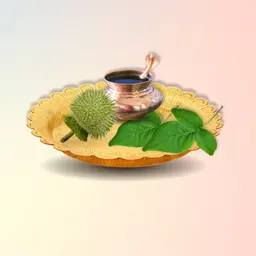
Description
In Hinduism, worship of Lord Shiva is known for its simplicity and depth. Among the various rituals, offering Jal (holy water), Bilva Leaves, and Dhatura (Datura flower/fruit) holds immense spiritual and symbolic significance. These offerings are not just part of traditional practice — they are a powerful expression of love, surrender, and devotion.
Especially during the holy month of Shravan (Sawan) or on Mondays and Shivratris, millions of devotees perform these offerings at temples like Kashi Vishwanath, Omkareshwar, and Kedarnath to seek the blessings of Bholenath – the easily pleased deity.
The Power of the Three Offerings
1. Offering Jal (Water)
Water, or Jal, is the most basic and universal offering to Lord Shiva. It is believed to cool his fierce energy and symbolizes purity, surrender, and inner cleansing.
Spiritual Benefits:
-
Purifies the devotee’s mind and soul
-
Balances karma and removes negativity
-
Enhances mental peace and clarity
How to Offer:
Pour clean water (or Ganga Jal) on the Shivling while chanting “Om Namah Shivaya” early in the morning.
2. Offering Bilva Leaves (Bael Patra)
Bilva leaves are extremely dear to Lord Shiva. Each leaf, typically having three leaflets, represents Shiva’s three eyes and the Trimurti (Brahma, Vishnu, and Mahesh).
Scriptural Reference:
"Bilvasya dalam dadyat shivalinga samarpayet,
Sada shivaprayo bhavet punyam atyantam ashnute."
– Shiva Purana
Benefits of Offering Bilva:
-
Removes sins and doshas
-
Brings peace, health, and prosperity
-
Grants protection and spiritual upliftment
How to Offer:
Use fresh, clean Bilva leaves. Place them with the smooth side facing up and the stalk pointing away from you.
3. Offering Dhatura (Datura Flower or Fruit)
Dhatura is a wild flower and fruit offered exclusively to Shiva, who accepted it even though it’s considered poisonous. This reflects Shiva's role as the Neelkantha – the one who drank poison to save the universe during the Samudra Manthan.
Spiritual Significance:
-
Represents surrender of negative thoughts and toxins
-
Helps in conquering fear, ego, and illusions
-
Powerful in overcoming obstacles and harmful influences
Why Dhatura for Shiva?
Shiva resides in cremation grounds, away from material beauty. He accepts even wild, bitter, or poisonous offerings — symbolizing that no offering is too impure if made with true devotion.
Ritual Process – How to Offer Jal, Bilva & Dhatura Together
Items Required:
-
Clean water or Ganga Jal
-
Fresh Bilva leaves
-
Dhatura flower or fruit
-
Optional: White flowers, Sandalwood, Incense, Camphor
Steps:
-
Take a bath and wear clean clothes.
-
Sit facing east or north in front of the Shivling.
-
Offer water while chanting “Om Namah Shivaya.”
-
Gently place Bilva leaves with the mantra “Om Bilvapatraya Namah.”
-
Offer the Dhatura fruit or flower with devotion.
-
Light a diya, perform a simple aarti, and meditate on Shiva.
When to Perform This Ritual?
| Occasion | Significance |
|---|---|
| Shravan Maas | Most auspicious month for Shiva worship |
| Mondays (Somvar) | Special day dedicated to Lord Shiva |
| Mahashivratri | The night of cosmic union |
| Pradosh Vrat | Bi-monthly fast observed in honor of Shiva |


